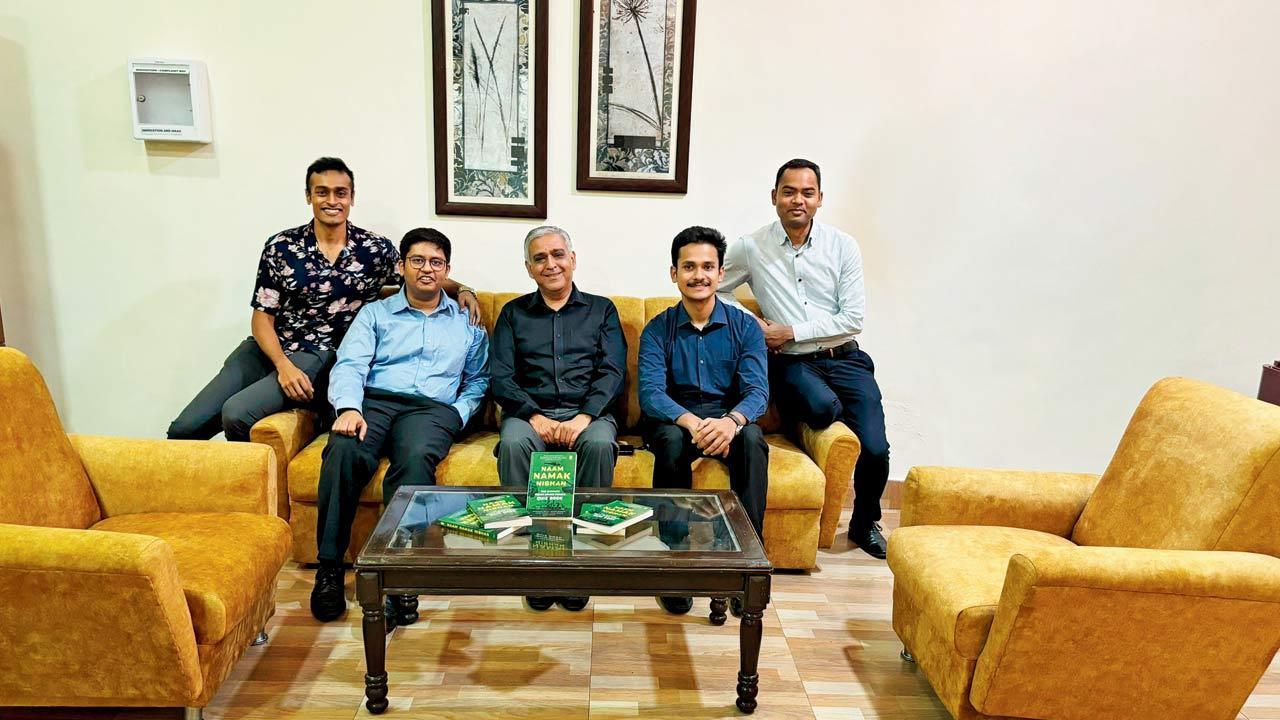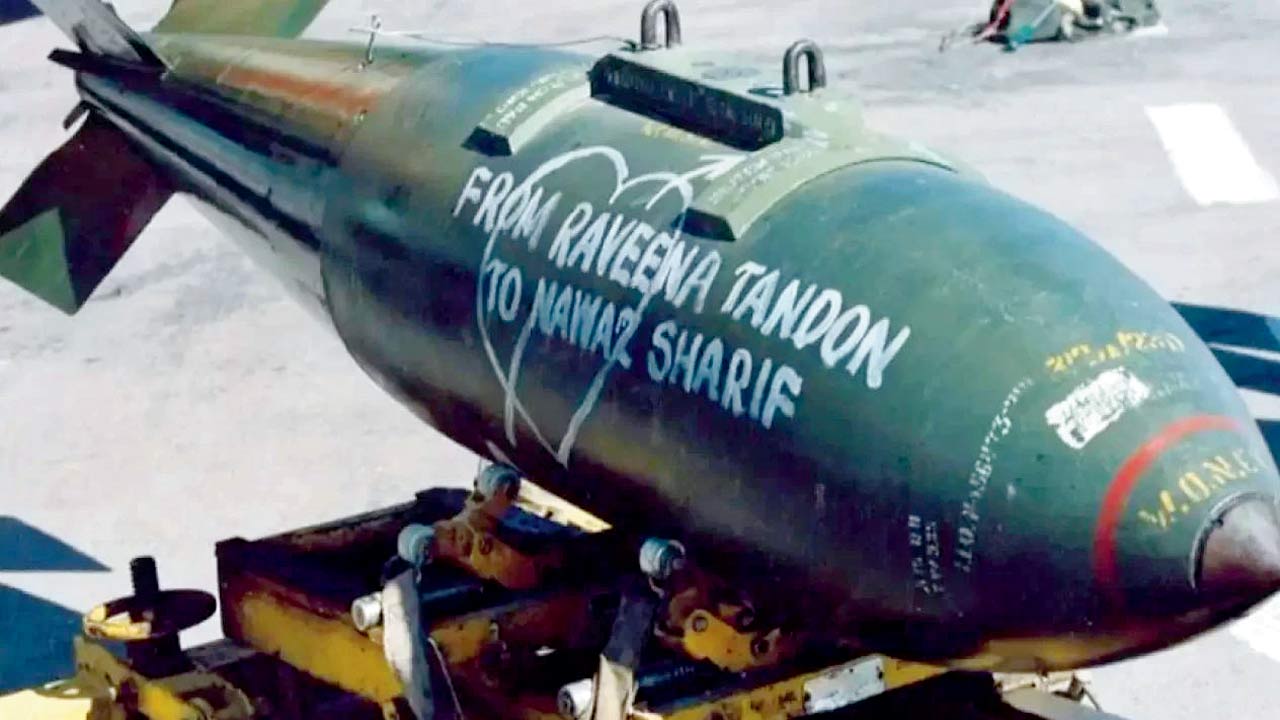Five army doctors reunite to create the second edition of their quiz book, celebrating the Indian Armed Forces

The five authors—Air Commodore Anurakshat Gupta, Surgeon Lieutenant Commander Hitesh Mahato, Dr Anmol Dhawan, Flight Lieutenant Arnabh Sengupta, and Flying Officer Sagnik Sarkar—posted in different corners of the world, continue their quizzing journey
![]() There are books on Indian military history, and then there are intriguing quiz books with bite-sized information on the Indian armed forces. There are historians who chronicle the armed forces in detailed, weighty tomes, and then there are quizzer-doctors who, while navigating their daily routines, craft engaging brain-teaser collections. In both cases, it is the latter that attracts the lay reader to intriguing nuggets.
There are books on Indian military history, and then there are intriguing quiz books with bite-sized information on the Indian armed forces. There are historians who chronicle the armed forces in detailed, weighty tomes, and then there are quizzer-doctors who, while navigating their daily routines, craft engaging brain-teaser collections. In both cases, it is the latter that attracts the lay reader to intriguing nuggets.
ADVERTISEMENT
Naam Namak Nishan 2 (Penguin, 190 pages) is particularly noteworthy because it reunites a diverse team of five doctors, spread across different ages and living in various parts of the world. Their reunion for the sequel underlines their passion for quizzing. Standing firm at the intersection of armed forces’ history and pop culture quizzing, Naam Namak Nishan 2 (N3-2) is a compelling and valuable addition to the literature on the Indian armed forces presented through multiple prisms—geography, mythology, sports, fashion, arts and, of course, nation-building. As Commodore Srikant Kesnur (retired) describes in the foreword, N3-2 serves “as a stepping stone in the journey of curiosity”, catering to varied readers—a future mastermind, a quizzing ace, a military enthusiast and a historian.
Pune’s Armed Forces Medical College (AFMC) lies at the heart of the N3 team’s chemistry. A shared passion for quizzing and years of experience brought the five doctor-authors together to create a public resource. In one way, senior faculty member at AFMC Pune, Air Commodore Anurakshat Gupta, rallied his four students to contribute to the book. Despite only a few overlapping years, team members—Hitesh Mahato, Anmol Dhawan, Arnabh Sengupta, and Sagnik Sarkar—researched and wrote the books in unison.
 A photo from the book featuring a memorial dedicated to the sea harrier, an Indian Navy’s fighter jet, at Bandra Bandstand
A photo from the book featuring a memorial dedicated to the sea harrier, an Indian Navy’s fighter jet, at Bandra Bandstand
Surgeon Lieutenant Commander Hitesh Mahato is a pathologist in the Indian Navy; Dr Anmol Dhawan is a radiologist and a fellow in Cardiopulmonary Imaging in the US; Flight Lieutenant Arnabh Sengupta is a medical officer in the Indian Air Force; and Flying Officer Sagnik Sarkar is interning as a medical officer.
As the second book hits the stands, the cross-continental team already has the bandwidth for a third edition. “We’re not yet sure about a third offering because we need to assess the unexplored sub-themes that will further unravel the armed forces in quiz format. Also, we don’t want quiz fatigue to set in regarding the armed forces. But we are certainly touched by the popular response, not just from Indians working in the forces,” says Dr Gupta, currently in Pune, whose quizzing exploits have won many global accolades. He is the founder-director of the International Quizzing Association and has appeared on BBC Mastermind and KBC as an expert; he is also a multiple-time national finalist in the Tata Crucible quiz. Mahato has served as quizmaster at Jigyasa, the inter-defence institutional quiz at AFMC in 2019, and was twice a Tata Crucible Pune City finalist. Dr Dhawan is a Tata Crucible Campus Quiz International champion. Sengupta is a Tata Crucible Pune winner and the SBI Quiz Pune winner, while Sarkar has excelled as a national finalist in ConQuest, the law quiz; Swarnim Vijay Varsh quiz at CME, Pune; and the INTACH heritage quiz.
Leafing through N3-2 is like leisurely walking with valorous men and women in uniform. The rapid-guide Q&A format, aided by pictures and crosswords, and a commemorative chapter on the Kargil conflict, awakens the reader to the pan-Indian footprint of the forces that have kept us safe as a nation. Beginning with the pre-Independence era, the book first acquaints us with the contributions of forgotten Indian soldiers in the “tumultuous theaters of the world wars”. For instance, the Mysore rockets used by Tipu Sultan to take on the British forces in 1780 featured pioneering advanced designs in rocketry, later adopted by the British in the Napoleonic Wars.
 While researching a quiz question about Commander Vijayalakshmi Ramanan (left), the designer of the Air Force saree uniform, the authors uncovered that decades ago she had also delivered Anurakshat Gupta, the book’s lead author
While researching a quiz question about Commander Vijayalakshmi Ramanan (left), the designer of the Air Force saree uniform, the authors uncovered that decades ago she had also delivered Anurakshat Gupta, the book’s lead author
Did we know the Khalanga War Museum in Dehradun stands as the only war memorial in the world built by the victor—the British Indian Army—to honour the heroism of their gallant Himalayan enemies, the Gurkhas, in the Battle of Nalapani (1814)!
Braveheart sepoy Bindee Tiwari commanded a British camp in Barrackpore (1824), which is now immortalised in the form of a temple.
As the book transitions to Independent India’s first five decades, the reader rejoices in key military operations that secured volatile borders and strengthened infantry schools, regimental centres, and cantonments. Replete with “did-you-know” moments, the narrative honours the IAF strategy in Dhaka (1971), which overwhelmed the Pakistani forces and led to the creation of independent Bangladesh. The bravery of Major Chewang Rinchen, Second Lieutenant Arun Khetrapal, and Lance Naik Dhan Bahadur Rai is celebrated in the conflicts with Pakistan. Other key conflicts, like the 1962 dispute with China, also exemplify India’s strategic wins. It is rewarding to be quizzed about a canopied memorial located in the easternmost corner of India, which pays tribute to 642 fallen soldiers who counter-attacked Chinese invaders in November 1962.
 The book includes trivia such as the infamous “Raveena missile”, which was dropped by the Indian Air Force during the 1999 Kargil War with the words “From Raveena Tandon to Nawaz Sharif” inscribed on it—a taunt to former Pakistan PM Nawaz Sharif, who was a fan of Raveena Tandon
The book includes trivia such as the infamous “Raveena missile”, which was dropped by the Indian Air Force during the 1999 Kargil War with the words “From Raveena Tandon to Nawaz Sharif” inscribed on it—a taunt to former Pakistan PM Nawaz Sharif, who was a fan of Raveena Tandon
By highlighting places like Walong (Arunachal Pradesh) and other hidden gems, the quiz book encourages readers to rethink conventional tourist maps and bucket lists. It seeds the idea of visiting unique destinations of military importance, specifically designed to offer more than just fleeting selfies.
Just as chronology drives the quiz book, random nuggets also encourage the reader to dive (mid-chapter) into trivia. It is fascinating to learn about the Women’s Royal Indian Naval Service, which facilitated the first recruitment of women as officers with hands-on ship training. Kalyani Sen, the first woman officer who went to the UK in 1945 for training, was the future wife of Lieutenant General L P Sen. Their daughter, Mala Sen, wrote the book on bandit queen Phoolan Devi.
Interestingly, the N3-2 recommends ample further reading, such as the biography of naval visionary Admiral Adhar Kumar Chatterji, The Admiral Who Shed His Vice.
The quiz book weaves in multiple popular elements, such as the origin of the word “gauze” from Gaza, the designing of the Air Force saree uniform, and the upcoming movie Ikkis in 2025 by Sriram Raghavan, set against the backdrop of a daring tank battle. The second edition contains treasure troves that could not be accommodated in the first due to word limits. This edition also factors in feedback from the first, besides focusing more on Navy and Air Force questions.
Posted in different corners of the world, members of the N3 team met virtually every fortnight for the making of the book, in addition to daily WhatsApp chats. “The first book created a supportive environment for us, but we never compromised on work hours. We divided work smartly—AG sir and Sagnik pored over history, Anmol focused on the colonial dynamic, and Arnabh and I followed topical issues and current affairs We are all in the habit of bookmarking potential questions, so at any given point in time, we have a quiz ready in our mind,” recounts Mahato.
The N3 team thrives on the feedback from strangers and friends across the globe—whether it’s a ship’s doctor who used the book to launch a quiz show for batchmates or institutions like AFMC that have bought the books as gift souvenirs. Interestingly, patients of the five doctor-authors frequently purchase the books and share photos of their copies as a gesture of gratitude to their fauji medicos.
During the creation of Naam Namak Nishan 2, the authors experienced delightful moments of discovery. For instance, while researching a quiz question about Wing Commander Vijayalakshmi Ramanan, the designer of the Air Force saree uniform, they uncovered that decades ago she had also delivered Anurakshat Gupta, the book’s lead author. These unexpected yet heartwarming connections, sparked by the quiz-making process, brought the team even closer.
Sumedha Raikar-Mhatre is a culture columnist in search of the sub-text. You can reach her at [email protected]
 Subscribe today by clicking the link and stay updated with the latest news!" Click here!
Subscribe today by clicking the link and stay updated with the latest news!" Click here!







